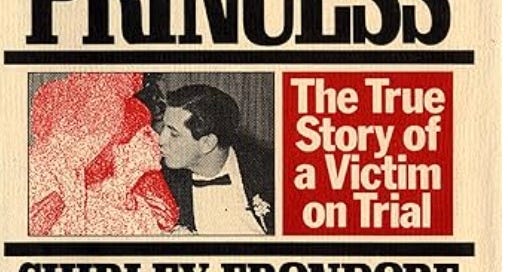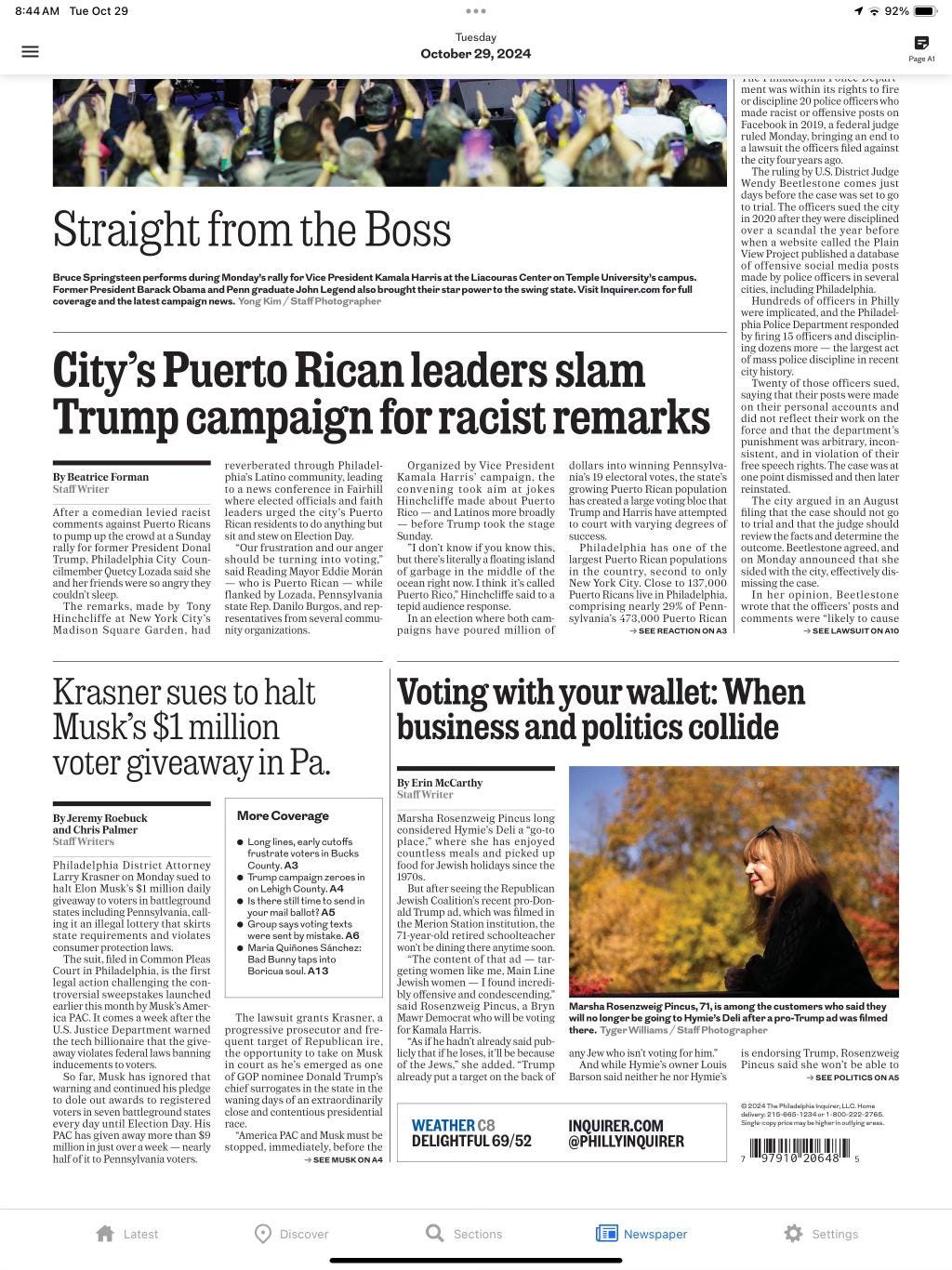Front page Philadelphia Inquirer, below the fold.
I was interviewed for this story last Tuesday after posting my response to the "Hymie's story" which for a brief minute dominated the local news conversation before it disappeared amidst other more dangerous stories -- like the recording of John Kelly admonishing us about trump's fascism, or jeff bezo pulling an endorsement for Kamala Harris days before the election seeming to submit to the strongman in advance or the MAGA hate fest at Madison Square Garden where surrogate after surrogate made crude and racist "jokes" about Puerto Ricans, African Americans, Jews and Palestinians.
They saved some of their crudest vitriol for the Vice President, winkingly calling her the "c-word" ( hahaha we meant communist right.) and characterizing her campaign people as her pimps. They didn't even bother to pretend they weren't calling her a wh**e.
So I was interviewed almost a week ago and that's decades in the current low attention span news cycle. And the reporter accurately captured the nuances and complexities of the boycott/buycott consumer landscape.
But in rereading the piece today and after having a brief conversation on the "Family Thread," I realized that my anger and pain about that ad was bigger and deeper than the issues of this election.
After living in other parts of the country for ten years, I had come home to the same demeaning and dehumanizing representations of Jewish women that I had grown up with, fought against and navigated my entire life.
And what was worse was the powerful reminder that often the creators and perpetrators of these negative stereotypes of Jewish women came not from Gentile men, but from our own brothers, fathers, boyfriends, and husbands. Some Jewish men, to deflect the anti-Semitism coming their way, believed that could be accepted by these white Christian men if they projected all of the negative images onto us.
And it's worked! Think of TV shows written by Jewish men where the "shiksas" got the Jewish man, or the stereotypes of the Jewish mother. And let's never forget the image of the JAP - Jewish American Princess -- a loud mouth materialistic social climber who berates her husband so much that he has to kill her!
The jury bought that defense and he was let go. This story was documented in a book entitled "Death of a Jewish American Princess" and it still gives me nightmares to remember that this caricature of a Jewish woman - a wife, mother, and daughter - was not only employed as a defense for murder -- ( her nagging drove him to the point of insanity) but that it was deemed as a convincing and legal argument which exonerated him.
The message was understood by every who followed that story. read the book about it or watched the series. Jewish woman who are natural nags, climbers and materialistic ball busters were not protected from murder under the law in Arizona.
There is a word for this kind if in-group gender hatred in the African American community - misogynoir. And we are seeing this play out in the run up to this election.
identity is complex and there is always an intersection between race, class and gender.
I am wondering if anyone reading this has heard of an analogous term for the internal resentment of Jewish women by Jewish men. I've been searching for that term and haven't found anything which addresses animus towards Jewish women in particular. Lots of stuff on anti-Semitism but all generic or just about men.
Like a fish who doesn't realize she's swimming in water until she jumps out of the bowl, I never questioned these images of Jewish women. I lived and worked and spent much of my time among other Jews and breathed those negative self images in like air internalizing them.
I will never forget the moment when that changed.
I was in New Mexico with a friend from New York and we stopped at a roadside crafts sale near Taos. As we were browsing the pottery my friend and I were talking with each other -- me with my Philly twang and she her with her New York accent.
A really good looking man, sitting behind a table of his ceramic wares stopped us and said, "Are you women Jewish?"
"Why would you ask that?" I replied nervously.
"Well you sound like my ex-wife! She was from the east coast and she was Jewish. So is my current wife. And my daughters."
I was standing there. holding my breath, waiting for the insults to come. The ones I was so familiar with my whole life.
"I LOVE Jewish women!" he declared. 'They are so loving and supportive and earthy and real. No other women like them.'
I can't tell you how difficult it was for me to believe I had heard him correctly.
"Seriously?" I asked. "I never heard that before in my life."
"Then must not have been in the right places. Jewish women are creative and sexy and smart and care about the world."
I thanked him and bought a couple of his pieces before getting back in our car and heading back to Santa Fe.
Now I know we could say that his comments were also stereotypes, different from the ones of Jewish men had of us, but still not complete pictures of human beings.
Or that he was a good salesman.
But it CHANGED me inside. Just hearing the possibility that as a Jewish woman I could be seen as something positive and different from the images which had defined my identity in Philadelphia uplifted me.
Soon after that, through retirement and other life changes, I moved to New Mexico. Lived their for seven years and then most recently spent another year living in Eastern Montana. And no where at any time did I have to worry that I was being seen as a yenta, a ball buster, a whiner, a princess, a nag, an overbearing mother, etc etc.
When I made the decision to move back here to be closer to my children and grandchildren at this time in my life, I had some trepidations about being in a community with Jewish men once again.
The trump ad that Lou Barson allowed to be filmed in his iconic and popular restaurant - one that capitalized on the most egregious and damaging images of Jewish women - a loyal part of his clientele hurt.
It hurt then when I first saw it. It hurt when I read what Barson said about it. And it hurts even more in the days that have followed the ad as the anger and divisiveness grows.
It hurts politically of course. For all the obvious reasons. But it was also personal to me.
After years of living outside of a concentrated Jewish community, I have come "home" only to return to what I needed to leave in the first place.







Wow Marsha...my brain is racing through a myriad of thoughts.Have I been guilty of reinforcing those stereotypes and misperceptions of Jewish women? Have I snickered, winked and nodded in agreement with those who would demean woman? Some introspection is needed at this time.